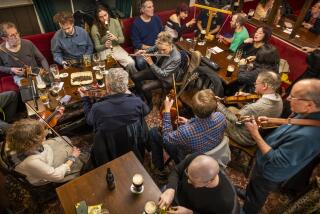Japanese Investment Firm Placing Its Bets on Pubs
- Share via
LONDON — Think of the heart of England, that welcoming neighborhood pub: British tradition at its homiest, a refuge of good conversation about life and the daily double washed down with pints of beer. Now take a sip and think of globalization: the cross-border, cross-cultural whirl of century-end ideas and capital.
Is a Japanese investment bank becoming the largest owner of pubs and the No. 2 owner of bookmaking joints in Britain?
Bet on it.
Already the unlikely owner of 5,439 pubs, the London arm of Tokyo-based Nomura Securities on Friday agreed to the $1.1-billion purchase of William Hill, Britain’s second-largest chain of bookmaking shops, with 1,531 outlets.
Nomura International, whose European headquarters is here, has spent more than $12 billion in Britain since 1995 in investments that reach deeply into British daily life.
William Hill, a case in point, has a 24% share of off-course betting in Britain. Its blue-signed shops are a fixture of Main Streets around the country. The company, which employs 9,000 workers, made a profit of about $87 million last year.
Nomura companies also lease equipment that carries commuters back and forth to work on Britain’s privatized railroads. And they own 57,000 properties bought from the government, which they lease back as officers’ housing to the Ministry of Defense.
It is the pubs, though, that raised eyebrows: A $1.9-billion deal for them was announced last month. When the transaction is complete, Nomura will own nearly one British pub in 10--9.5% by count of James Turner, seconded by Nomura to become chief executive of the new pub venture.
“Other investment institutions have not focused on that sector of the property market, so this is the first venture into the pub world,” Turner said.
The pubs include neighborhood haunts, big-name “destination pubs” and quaint rural rendezvous for a quiet drink.
“There may have been a shock within the financial industry because a large portfolio of pubs is not the kind of thing that investment banks go out and . . . buy. But we think it is a very good business,” Turner said.
Success with the first 1,800 pubs purchased in 1995 provided the confidence for the new purchases, Turner said.
“Everybody has to have a drink now and then,” Turner joked. “In fact, British pubs produce strong cash flows. . . . A diverse portfolio and a strong cash flow make them a very attractive investment.”
Nomura’s pubs will be leased to individual or corporate operators for periods ranging from one to 30 years, Turner said, generating what Nomura expects to be a stable, long-term cash flow. Decor and product line will be left to lessees, and habitues will probably never know that the property is owned by an investment bank, let alone a Japanese one.
Turner notes that in many areas of Britain, traditional pubs have gone upscale in recent years, adding diversity and greater competition at the retail end of the market.
“It’s quite an exciting business,” said Turner, “but I wouldn’t expect Japanese beer and sushi replacing classic pub food.”
Is there a future for a ploughman’s sandwich and pickled onions in the globalized British pub?
Bet on it.
More to Read
Inside the business of entertainment
The Wide Shot brings you news, analysis and insights on everything from streaming wars to production — and what it all means for the future.
You may occasionally receive promotional content from the Los Angeles Times.









